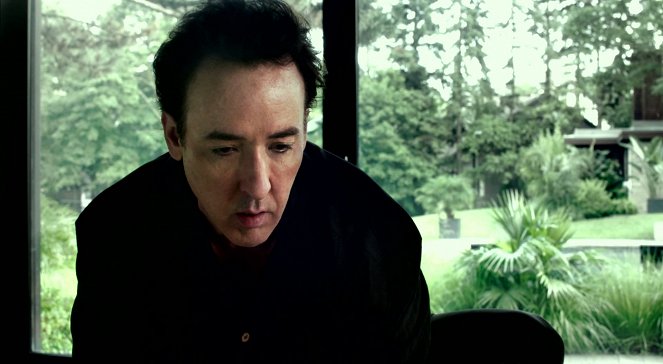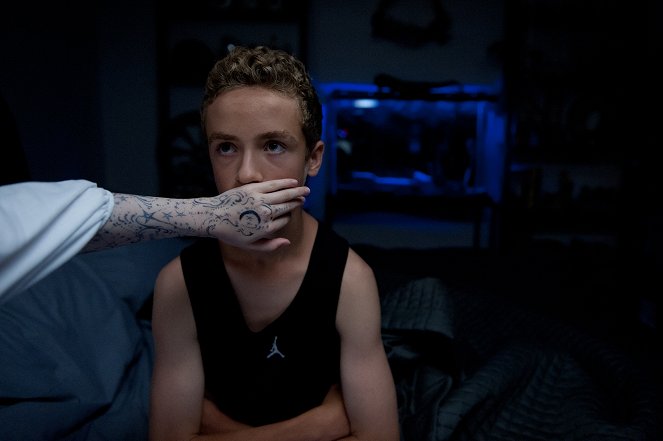Réalisation:
David CronenbergScénario:
Bruce WagnerPhotographie:
Peter SuschitzkyMusique:
Howard ShoreActeurs·trices:
Julianne Moore, Mia Wasikowska, John Cusack, Olivia Williams, Evan Bird, Robert Pattinson, Sarah Gadon, Niamh Wilson, Kiara Glasco, Jonathan Watton (plus)Résumés(1)
A Hollywood, la ville des rêves, se télescopent les étoiles : Benjie, 13 ans et déjà star; son père, Sanford Weiss, auteur à succès et coach des célébrités; sa cliente, la belle Havana Segrand, qu'il aide à se réaliser en tant que femme et actrice. La capitale du Cinéma promet aussi le bonheur sur pellicule et papier glacé à ceux qui tentent de rejoindre les étoiles: Agatha, une jeune fille devenue, à peine débarquée, l'assistante d'Havana et le séduisant chauffeur de limousine avec lequel elle se lie, Jerome Fontana, qui aspire à la célébrité. Mais alors, pourquoi dit-on qu'Hollywood est la ville des vices et des névroses, des incestes et des jalousies ? La ville des rêves fait revivre les fantômes et promet surtout le déchainement des pulsions et l'odeur du sang. (Le Pacte)
(plus)Vidéo (11)
Critiques (6)
L'horreur incompréhensible, dont le sujet aurait pu être traité de manière passionnante par d'autres créateurs (Sam Mendes, David O. Russell), Cronenberg était autrefois dans mon top 10 des réalisateurs et j'adore encore une grande partie de son travail (y compris des pièces controversées comme Crash). Sa singularité réside dans sa capacité à présenter de manière compréhensible et acceptable les déviations pathologiques de la "norme" et à en faire partie intégrante d'une histoire captivante. Mais avec Maps to the Stars, il a dépassé les limites, le film est un fardeau insupportable, une vitrine de personnages allégoriques si éloignés de la réalité que leur définition et la signification de leur interaction se perdent. Je donne une étoile pour Julianne Moore, qui pourrait épater par sa performance même en jouant un concombre.
()
In Maps to the Stars, David Cronenberg ruthlessly settles the score with nothing less than Hollywood itself and its glamour. This perspective brings disillusionment from a world where ruthless competition, pretense, cynicism, and the pursuit of pleasures prevail. In the chosen viewpoint, Cronenberg is not original; others have also gone after the dream factory in a similar manner. However, Cronenberg can rely on the quality acting of several film stars, led by Julianne Moore. She provides yet further proof that she belongs in the top rankings of contemporary actresses. Her fading film star is able to change all imaginable moods and expressions on the surface offered by the script. Mia Wasikowska, who is a generation younger, skillfully supports her. At the same time, Cronenberg can rely on his intimate knowledge of the environment, and some of his jabs are effective and precise. Essentially, I like his directing style, but one can't help but feel that the mysterious layer of the story is actually unnecessary, and above all, the crazy twist based on incest is contrived and the director could have treated the resolution of his story much more rationally without sacrificing the credibility and effectiveness of the story. A comparison with the famous Mulholland Drive by a different David is readily available, as they both play with the same environment, expressive means, and genre combinations, but the result is not flattering for Cronenberg. Lynch managed to play with Hollywood, genre references, and the viewer much more cleverly, sophisticatedly, and entertainingly. At the same time, I fear that outside the classic festival circuit, Cronenberg will not find much understanding for his perspective on the filmmaking world. Perhaps a note on the genre - labeling this piece as romantic carries the same weight as speaking about romance in the film The Hurt Locker since James really had a passionate relationship with war. Overall impression: 60%.
()
“Secrets Kill.” Cronenberg scrutinises the American film industry as a malignant outgrowth of the industry capitalist system. The relationships between the characters are almost exclusively of an opportunistic nature. Parents give business priority over their children. Friends, even dead ones, serve only for gaining fame, or a role. The human body is seen as a commodity that can be monetised in various ways and kept in good condition by applying the right products. The pathologically narcissistic, self-centred characters are guided by the logic of “everything must be kept in the family”, which is also the defining characteristic of Hollywood and the central theme of the film. ___ Hollywood here is a model of a morally bankrupt society whose members have lost their awareness of the real world and even their own identities. They have become characters in a limited number of constantly varying stories in which they have performed or would like to perform. Cronenberg himself does not make it clear what kind of story we are watching. The narrative is intentionally ambiguous and at least on the first viewing does not make it possible to distinguish where the cruel satire ends and the degenerate family melodrama begins (only on the second viewing will you appreciate how the film works with the motif of blood from the visit of a non-Hodgkin’s lymphoma patient). ___ Agatha’s arrival in Beverly Hills promises the fulfilment of the ”rise-to-stardom” formula about a girl who gradually achieves fame (see, for example, All About Eve). But as suggested by her burn scars (the film’s most obvious connection to Cronenberg’s bodily horror), the girl is not completely untainted by the world of show business and she will clearly not be a passive observer of the excesses around her, which she could subsequently turn into a novel or screenplay. ___ The gradual revealing of how exactly Agatha fits into the web of twisted relationships happens at roughly thirty-minute intervals (after half an hour, she goes to work for Havana; after an hour, she visits Benjie). The gradual doling out of new dark secrets and the disturbing soundtrack, which connects the characters long before we find out how they are connected in reality (Éluard’s poetry, recited by the dead and read by the living, serves a similar connective purpose), keep us in constant suspense despite the (intentional) formalistic rigidity. Almost the whole first hour of the film is presented using static shots of the characters talking. In the second hour, both the relationships between the characters and the camerawork have greater dynamics. From the beginning, the formalistic simplicity and minimalistic mis-en-scène are offset by the characters’ outlandish behaviour. ___ So that it won’t be easy for us to create our own map of the relationships between the stars, not only does the film spend a long time keep important information secret, but the characters also lie to each other (for example, Agatha disowns her father in front of Havana and fabricates a story about how she got burned). As mere media constructs, the film’s characters are not much more real than the ghosts of the past that visit them at night and force them to confront the past that they have obstinately denied and who they really are beneath the caricatures of themselves, to which they have become unhealthily accustomed. Instead of helping them to find answers and inner peace, Cronenberg grants some of them a different wish in the conclusion – to appear in an eccentric arthouse film. This spiteful gesture clearly expresses the director’s distaste for playing by Hollywood’s rules (even if it’s a Hollywood satire), while finally obliging his fans, who see him mainly through the prism of his perverse early works. You will most probably fully appreciate the fact that Maps to the Stars is comparably perverse, though not in the sense of physical repulsiveness, only after a repeat viewing. 75%
()
(moins)
(plus)
Cronenberg's critique of capitalism and the hypocritical society of deception is as superficial as Wagner's screenplay and as artificial as the digital barbecue at the end. The show of half-details, which in the case of A Dangerous Method really created the image of the world as an integral mirror, which gradually cracks and turns into something desperately anachronistic and toothless in this postmodern stylization. There is in it some vain preaching and the inability to get to anything sick (beyond the sick endeavor of the screenplay). A freak show full of superficial caricatures and patterns, the innards of which can be seen from the very first moment. There is something wrong with a film in which Robert Pattinson is the most sympathetic and believable character. Master, it's time to film your harvest festival.
()
I was expecting a sharp Hollywood satire, but even though it’s a non-Hollywood film about the Hollywood environment, the satire is not as bold as I thought it would be. We get some dialogues here and there mocking the fads and mannerisms of the stars, but it’s mostly a subversive and untraditional movie about relationship with protagonists that are fucked up in a way that not even in Hollywood must be common. Really, such a parade of perverted and self-destructive characters is not something you see every day. Cronenberg is in true form this time, and though fans of his earlier works won’t find much physical nastiness, the inner psychical nastiness is more than enough, to the point that the film won’t be very easy to digest for many viewers, even if it’s told detachedly and with black humour. It’s edgy fun, and it worked superbly for me. 9/10
()



Annonces